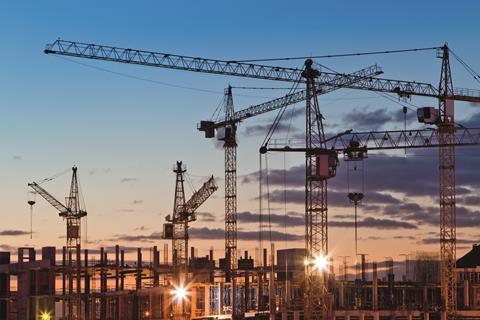
In its 2019 regional crane survey for Belfast, Birmingham, Leeds and Manchester, Deloitte highlighted the residential sector as the most active for the second year running, but warned of an increasing need for infrastructure investments in cities to keep up with the rate of development and support more projects in the future.
Belfast
The Northern Irish capital saw 26 commercial and residential schemes completed or under construction last year. There were 12 new starts in the city, compared to nine in 2018. The number of residential units under construction during the year fell 36% to 132 and the amount of PBSA being built dropped 23.2% to 1,429 beds.
The city saw the amount of office space under development increase by 37% to 839,502 sq ft. Deloitte said while Belfast’s development pipeline is resilient, but that its infrastructure needs investment to support future development.
Birmingham
A record 775,000 sq ft of office space completed in Birmingham in 2019; a quarter of a million higher than any Birmingham crane survey on record. The supply is being met with strong demand, with 53% of the pipeline pre-let.
The number of new starts in the city dropped to 11 from 23 in 2018 and the volume of PBSA stock under construction fell by 30.4% to 1,857 beds. Residential units under construction increased by 8.7% to 5,506 units. The number of hotel beds being built also dropped, falling 15.3% to 375.
Leeds
Overall, new construction starts in Leeds fell from 21 new starts to 12 last year. However, the volume of residential units being built increased by 27% to 2,832 units. The majority (2,218) of these, Deloitte reported, are build-to-rent units in the city centre. The number of PBSA beds under construction also increased 1% to 2,799.
Manchester
Manchester saw the highest number of completed schemes since 2006 last year, with the completion of 27 developments. A further 47 schemes are due to complete this year. Of 12,357 residential units under construction in the city, 9,000 are expected to be delivered during 2020, after the delivery of 3,619 in 2019.
The city saw a 24% increase in hotel beds in development, which took the total to 2,446. The volume of office space being built remained much the same at 2.08m sq ft.
“It’s been a record year for residential with the three English cities delivering more homes than at any time since 2007 and our development pipeline suggests this trend will continue. However, fewer homes have been delivered than we’ve previously anticipated driven by a lack of skilled labour, increasing costs, scarcity of development land, and developers being at capacity. This could present real challenges for future delivery,” said Simon Bedford, partner and regional head at Deloitte Real Estate.
He added: “Developer sentiment remains high but we’re seeing real challenges arising in the need for infrastructure investment to keep up with the pace of real estate.
“Cities are recognising the climate change emergency and we expect to see policy shifts as cities respond, such as reducing vehicle access to city centres. This will have a near term impact on the development and construction sector and is an important theme we will be closely monitoring.”
Source: Office - propertyweek.com


